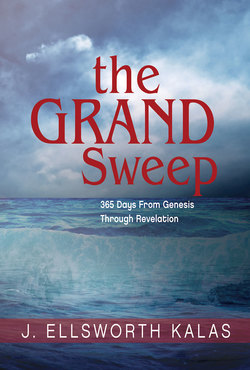Читать книгу The Grand Sweep - Large Print - J. Ellsworth Kalas - Страница 52
На сайте Литреса книга снята с продажи.
ОглавлениеPrayer Time
I will pray daily for the following professional church workers:
I will examine my heart about these aspects of my worship and service:
How the Drama Develops EXODUS 34—LEVITICUS 13
We might easily conclude that the development of the eternal drama is put on hold during the chapters currently under consideration. I’ll readily admit there is little physical action, little of the kind of movement that seems necessary to the unfolding of a plot. But action is only chaos unless there is also structure, and that’s where life’s rituals and laws come in. In these chapters, the action begins with a second chance. When we Christians think of the Law, we usually think of a rigid, unforgiving system. But the Exodus story tells us that before the Law ever had a chance to be implemented, it was violated, and that mercy had to intercede so the Law could be renewed and given again. The grace that culminates in Jesus Christ and the cross is foreshadowed in Exodus 34 when Moses cuts two tablets “like the former ones,” and God writes again.
How can a drama have any hope unless there is a second chance?
And then there is beauty, as symbolized by Bezalel and Oholiab and “everyone whose heart was stirred to come to do the work” (36:2). When I read the detailed listing of materials, measurements, and plans, I think of craftspeople I have seen at work—the kind of people who run their hands gently over a piece of wood to feel its texture in the soul, or the person who holds needlepoint at a distance and frowns, then smiles. The craftspeople who brought together that portable Tabernacle were sure they were involved in an eternal enterprise; they were constructing a place in which the Lord God would appear and where the people would meet the Eternal.
Of course, we find it hard to give attention to the intricate details regarding the sin offerings, the guilt offerings, the patterns of restitution, and the lengthy details of ordination. But perhaps we have hurried at the wrong places. Could it be that if we spent more time with sin and guilt offerings, we would spend less time on the psychiatrist’s couch? Did the ancient Israelites know something to which we ought to pay more attention when they took sin and guilt so seriously? Some issues of life simply won’t allow themselves to be hurried over; if we scurry on, ignoring them, they simply go undercover and attack us in our dreams or in uninvited thoughts. Israel had rituals for coping with sin and guilt; and at their best, they understood that those rituals were acted out before the God of the universe. It was this realization that brought true relief.
Ours is an age that easily confuses activity with achievement. The intricate, repetitive details of these chapters in Exodus and Leviticus require us to slow down, think, and be sure we do everything right. This is essential to the drama. A drama, after all, is more than action; it is scenery and setting, timing and costumes. Change the costuming in Shakespeare from seventeenth century to twenty-first century, and you give a very different flavor to the lines. And so it is with the rituals of our lives and the orderliness with which we receive them. When we read the insistent descriptions in these chapters, we are being prepared for the setting in which the action will take place. Without them, the action would be of a very different nature. All of this is part of who we are and how we relate to God.
Seeing Life Through Scripture
“Without blemish” is a phrase that appears often in the chapters of Leviticus that give us rules of worship. The people might be tempted to save the best of their flocks and herds for food or for marketing and give God the leftovers. No doubt! We are tempted as they were. When everything else is paid, we give God what (if anything) is left. We hurry to a church meeting with little preparation; we wouldn’t think of going so ill-prepared to a meeting for our business or profession. The church youth choir performs poorly; they admit their middle school or high school choir wouldn’t allow such shoddy work. We give God blemished offerings.
Another phrase that appears often is one that refers to certain offerings as having a “pleasing odor to the LORD.” A critic might think this language too anthropomorphic, portraying God as human. I think, rather, that the term puts God within our reach in a delightful way. It lifts my offering out of the tithe or line item on a tax form and lets me feel that God finds pleasure in my expressions of love. God is not austerely removed from me but so close as to smile when I place my envelope in the offering plate or when I labor to get my part right in the choir anthem. The Book of Leviticus tells us, in childlike yet profound ways, that God is blessed by our love.
The Sum of It All
“I am the LORD who brought you up from the land of Egypt, to be your God; you shall be holy, for I am holy” (Leviticus 11:45).
